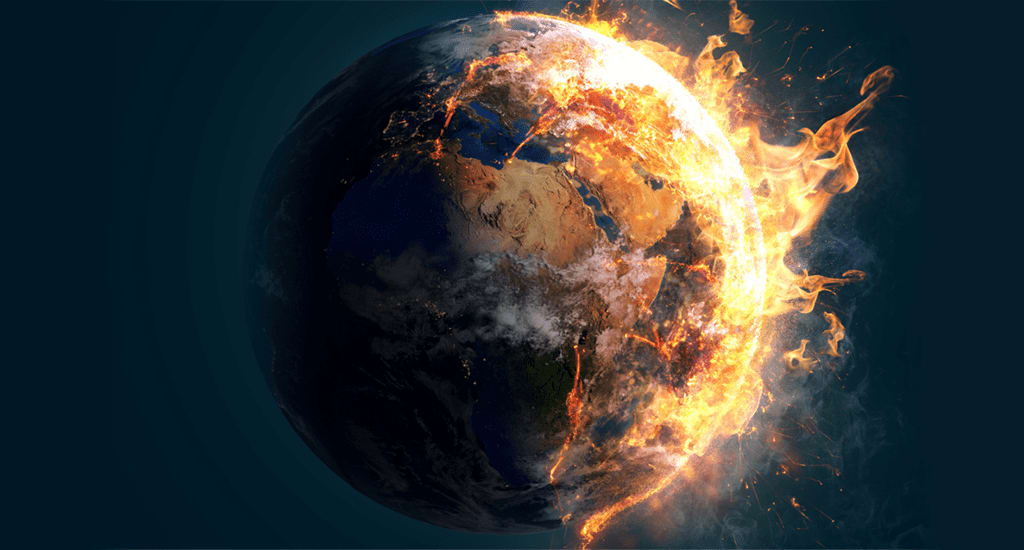Earth in 100 million Years!
HOW WILL PLANET EARTH LOOK IN 100 MILLION YEARS TO COME?

541 million years ago, a significant event known as the Cambrian explosion took place. It marked a rapid diversification and proliferation of complex animal life on Earth. The oceans were teeming with a variety of creatures, including trilobites, brachiopods, and early fish-like organisms. It was a time of great innovation and experimentation in the evolution of life forms.
Over millions of years, life continued to evolve and adapt to changing environments. Around 385 million years ago, the first terrestrial plants emerged, paving the way for the colonization of land. Plants gradually covered the continents, providing habitats and food sources for a wide range of organisms.
Fast forward to 252 million years ago, and the Earth experienced the most severe mass extinction event in its history, known as the Permian-Triassic extinction. It wiped out nearly 96% of marine species and about 70% of terrestrial vertebrate species. The event had a profound impact on the evolution and composition of life on Earth.
Despite the devastating extinction, life persevered, and new species arose. Around 201 million years ago, the first dinosaurs appeared, ruling the land for millions of years. They were followed by the emergence of mammals, which eventually led to the dominance of various mammalian species, including early primates.
Around 66 million years ago, another catastrophic event occurred—the Chicxulub impact. A massive asteroid struck the Earth, causing widespread devastation and resulting in the extinction of non-avian dinosaurs. This event cleared the way for the rise of mammals, including our primate ancestors.
Around 6 million years ago, the first hominins, early human-like creatures, appeared in Africa. These species eventually evolved into Homo sapiens, modern humans, around 300,000 years ago. Human history has been marked by remarkable achievements, including the development of agriculture, the rise and fall of civilizations, scientific and technological advancements, and exploration of the Earth and beyond.
And here we are today, living on a planet that has undergone immense transformations and harbors a diverse array of life forms. Our actions and decisions now shape the future of Earth and the trajectory of life on this planet. It's a reminder of the interconnectedness and fragility of our world, and the responsibility we hold as stewards of this extraordinary planet we call home
In recent history, humans have made remarkable strides in science, technology, and global connectivity. The industrial revolution in the 18th century marked a significant turning point, bringing about advancements in manufacturing, transportation, and communication. This period of rapid industrialization and urbanization propelled human societies into the modern age.
The 20th century witnessed groundbreaking scientific discoveries and inventions that transformed various aspects of human life. The development of electricity, automobiles, airplanes, and computers revolutionized transportation, communication, and access to information. Medical advancements, such as the discovery of antibiotics and vaccines, improved public health and increased human life expectancy.
The world was also shaped by a series of major conflicts and geopolitical shifts during the 20th century. Two devastating world wars brought about significant social, political, and economic changes, altering the global balance of power. The establishment of the United Nations in 1945 aimed to foster international cooperation and prevent future conflicts.
In the latter half of the 20th century, humanity achieved remarkable milestones in space exploration. The first human to orbit the Earth, Yuri Gagarin, embarked on his historic journey in 1961. The United States then took the lead in space exploration, landing astronauts on the moon during the Apollo missions in the late 1960s and early 1970s.
The advent of the internet in the late 20th century revolutionized global communication and connectivity. It opened up new possibilities for information sharing, commerce, and social interaction, leading to the emergence of a digitally interconnected world. The rapid advancements in information technology continue to shape our lives in the 21st century, with innovations such as artificial intelligence, blockchain, and the Internet of Things (IoT) transforming various industries and sectors.
However, the progress of human civilization has not been without challenges and consequences. Industrialization and technological advancements have brought about environmental degradation, resource depletion, and climate change. The world now faces urgent environmental issues, and there is a growing awareness of the need for sustainable practices to ensure the long-term survival of our planet.
In the face of these challenges, there is a global call for action to mitigate the impacts of climate change, transition to renewable energy sources, and promote conservation and environmental stewardship. Efforts are being made to develop sustainable technologies, promote biodiversity conservation, and foster international cooperation to address these pressing issues.
As we stand at the dawn of the 21st century, it is crucial for humanity to recognize the interconnectedness of our actions and their consequences for the Earth and all its inhabitants. We have the potential to shape a future that embraces sustainability, inclusivity, and progress. By harnessing the power of science, technology, and collective action, we can strive to build a world where humans and the natural environment coexist harmoniously, ensuring a prosperous and vibrant future for generations to come.
Advancements in science and technology continue to drive progress in various fields, shaping the way we live, work, and interact. The fields of biotechnology and genetic engineering have made significant strides, offering new possibilities in healthcare, agriculture, and conservation. Gene editing technologies like CRISPR have the potential to revolutionize medical treatments and eradicate genetic diseases.
In the realm of renewable energy, there has been a notable shift towards clean and sustainable alternatives. Solar power, wind energy, and other renewable sources are increasingly being adopted to reduce reliance on fossil fuels and combat climate change. The development of energy storage solutions, such as advanced batteries, is also making renewable energy more viable and accessible.
The exploration of space continues to captivate human imagination and expand our understanding of the universe. Mars missions, such as NASA's Perseverance rover and SpaceX's plans for colonization, represent ambitious endeavors to explore and potentially inhabit other celestial bodies. As space agencies and private companies collaborate, the possibilities for space exploration and its applications in science and technology seem boundless.
In parallel with scientific and technological advancements, social progress and cultural shifts are reshaping societies across the globe. Movements advocating for equality, inclusivity, and human rights have gained momentum, leading to significant legislative changes and shifts in public opinion. Issues such as gender equality, LGBTQ+ rights, racial justice, and access to education and healthcare are at the forefront of societal conversations.
Global interconnectedness facilitated by technology has given rise to a more interdependent world, where events in one region can have far-reaching consequences globally. The COVID-19 pandemic, which emerged in 2019, demonstrated the need for global cooperation in responding to health crises. The development and distribution of vaccines on an unprecedented scale highlighted the importance of collaboration among scientists, governments, and organizations to address global challenges.
As humanity navigates the opportunities and challenges of the 21st century, it is crucial to approach progress with a sense of responsibility and mindfulness. We must ensure that technological advancements are driven by ethical considerations, prioritize the well-being of individuals and communities, and promote sustainable practices. With a collective commitment to innovation, collaboration, and stewardship, we can build a future that embraces the full potential of human ingenuity while safeguarding the well-being of our planet and its inhabitants.
In conclusion, the story of human progress is an ongoing narrative, characterized by remarkable achievements, transformative discoveries, and persistent challenges. As we move forward, it is essential to harness the power of science, technology, and human collaboration to create a sustainable and inclusive future. By doing so, we can continue the journey of shaping a world that thrives on the principles of progress, compassion, and respect for both humanity and the natural world.
About the Creator
Enjoyed the story? Support the Creator.
Subscribe for free to receive all their stories in your feed. You could also pledge your support or give them a one-off tip, letting them know you appreciate their work.






Comments
There are no comments for this story
Be the first to respond and start the conversation.